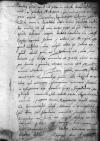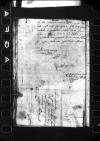List #6235
Christoph HEYLL do Ioannes DANTISCUSElbing (Elbląg), [1539]-08-26
| odebrano [1539] August 30 Rękopiśmienne podstawy źródłowe:
| ||||
Tekst + aparat krytyczny + komentarzZwykły tekstTekst + komentarzTekst + aparat krytyczny
Reverendissimo in Christo patri paper damaged⌈[tri]tri paper damaged⌉ ac principi, illustrissimo atque paper damaged⌈[e]e paper damaged⌉ [...] paper damaged⌈[...][...] paper damaged⌉ domino, domino
Maximi fiunt apud me, Pater in Christo Reverendissime simul ac Princeps Illustrissime, qui mediocri nati loco propria virtute sunt rerum dignitatisque fastigium assecuti. Qui enim a natalibus usque rerum principes existunt, hos mirum non est eum tenere posse, ut qui natura contigerit, ordinem. Eosque decebat et litterarum omnium et philosophiae cognitionem habere, si vellent, ut
Tuam igitur, princeps, illustrem eandemque reverendissimam gratiam tum doctrinam et rerum usu eximiam quamquam innumera summorum in Christiana republica heroum, papae, imperatoris regumque monumenta tuo merito parta non mediocriter exornant, propria tamen, reverendissime praesul, virtus tua humanitasque, id est, litterarum in te amplitudo (
qu(antu)m or qu(u)m⌈qu(antu)mqu(antu)m or qu(u)m⌉
illum tibi splendorem accersivit) summopere videtur commendare. Quae me, Praesul Illustrissime, res movet, ut gratiae tuae, nisi recuset, duos cupiam Galeni principis medici libellos, Latinitate utcumque donatos, dedicare, rogoque hanc ob rem clemen stain⌈[clemen]clemen stain⌉ Bcz, 1643, p. 506tia tua me ea de re certiorem reddat ac sibi persua hidden by binding⌈[a]a hidden by binding⌉deat nihil mihi esse gratius, quam tanto principi hidden by binding⌈[i]i hidden by binding⌉ tantisque, ut praedicatur, dotibus ornato placere.
Bcz, 1643, p. 506tia tua me ea de re certiorem reddat ac sibi persua hidden by binding⌈[a]a hidden by binding⌉deat nihil mihi esse gratius, quam tanto principi hidden by binding⌈[i]i hidden by binding⌉ tantisque, ut praedicatur, dotibus ornato placere.
Valeat in Christo bonorum omnium largitore Paternitas Tua, quam hidden by binding⌈[uam]uam hidden by binding⌉ et conatus ei omnes perpetuo in se amore fortunet(?).
A(nte) d(iem) septim(am) Kalendas ms. Septembreis reg. Septembres⌈Septembreisms. Septembreis reg. Septembres⌉,
Reverendissimae atque illustrissimae Vestrae Dominationis officiosissimus cultor

